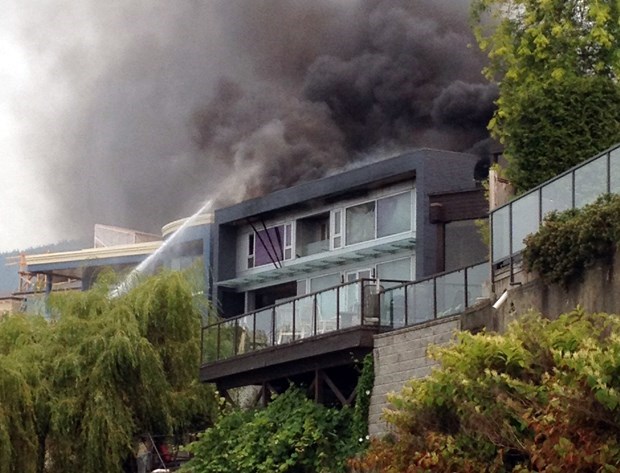A West Vancouver woman must demolish what remains of her waterfront mansion severely damaged by fire in 2015, a B.C. Supreme Court judge has ruled.
The property on the 2600-block of Bellevue Avenue has been the subject of “much litigation, making the history of this matter long and complex,” Justice Emily Burke acknowledged at the outset of her April 13 ruling.
Rosa Donna Este and her mother Mina Esteghamat‑Ardakani purchased the property in 2003 as tenants-in-common and Este lived there until the fire, according to the ruling, but the property has been contested through various family court actions over the years.
Since 2020, Este has sought building permits that would allow her to rebuild the home but those have been denied by the district on the grounds that the district’s Building Bylaw requires that permit applications have the signature of every owner of the property, the ruling notes, and Esteghamat‑Ardakani has written to district staff that she does not consent.
Este sought a judicial review of the district’s decisions, arguing the municipality has no statutory authority to deny her application. The district had previously granted her a permit without Esteghamat‑Ardakani’s signature, she noted.
And she argued that the district was interfering with her common law right to make use of her property.
At trial, the district drew attention to the language of the bylaw that refers “every owner of a property.” In cases of joint ownership, it is typically presumed that all owners are in agreement when an application for a permit is submitted, the district’s lawyer conceded, however in this case, it had been made explicit that one of the owners did not consent.
Ultimately, Burke sided with the municipality, particularly because property owners are liable for any damage done to municipal property done in the course of the permitted work.
“I accept the district’s submission that the express or implied consent of all owners is required prior to the issuance of building permits,” she wrote. “It would strain credulity to hold a co-owner liable for damage caused under a permit for which they have specifically withheld their consent—as is the case here. The absurdity of such an outcome weighs against the interpretation proposed by the petitioner.”
The district exercising its statutory authority did not amount to an impingement of Este’s rights, Burke added.
“The regulatory role municipalities play in this regard is a well-established limit on private rights over property,” Burke wrote. “Indeed, given that the petitioner’s use of the property is presumptively limited by the bylaws, it is her continued insistence on managing the property against her co-owner’s wishes which undermines the tenancy in common, not the permit decision.”
In December 2020, District of West Vancouver council passed a resolution ordering the demolition of burned out home, after years of complaints from neighbours about safety and security concerns.
Este also sought to have that decision overturned, arguing it would be dangerous to allow the structure to be taken down without also granting permits for a new one to replace it. Burke rejected that argument as well.
“There was sufficient evidence before the council to find letting the structure remain intact would create a greater risk to health and safety than demolishing it,” Burke wrote. “The council examined both the district and the petitioner’s evidence and preferred the district’s. Part of that referenced the fact that the district required any demolition to be done in a safe manner with the property to be left in a safe condition.”
Este alleged she had been denied procedural fairness by the district because, when it came time for a reconsideration hearing before council, she did not have her lawyer present. Burke concluded the municipality had been fair to Este, given that the hearing had already been rescheduled twice at Este’s request, and that there is no “freestanding and unassailable right to legal counsel at municipal hearings.”



